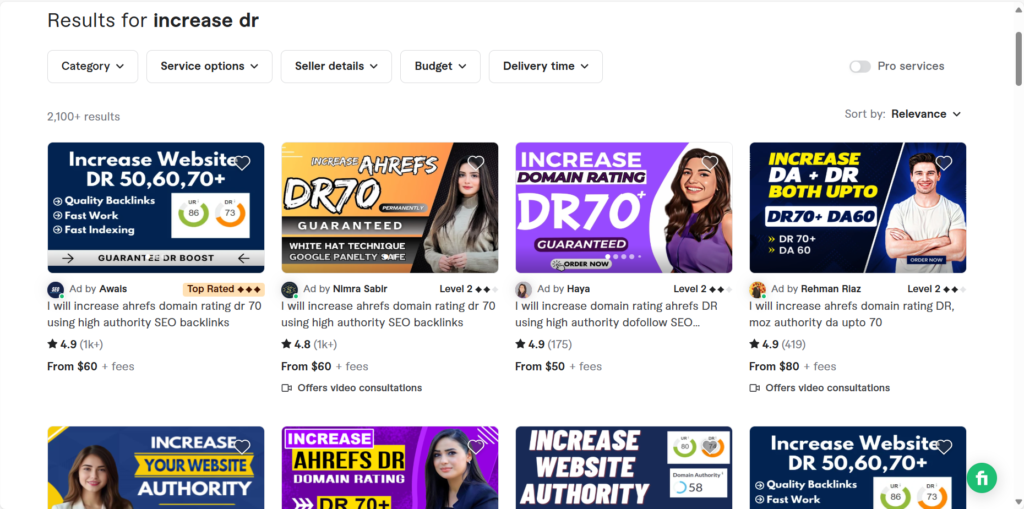As the title suggests, we often hear friends with independent websites say that the authority value of their websites is increasing, but the traffic of their independent websites is decreasing, and they don’t know why. Today, we can analyze the reasons.
1. Don’t be misled by the authority value, and don’t be obsessed with the so-called authority value
Because the so-called authority values can be cheated, and you can get it boosted for just tens of dollars. The following screenshots are the Gigs on Fiverr for boosting the authority value. You can guess for yourselves what kind of people would go for boosting the authority value.

The website authority value is a result calculated by third-party tools such as SEMrush, Ahrefs, and MOZ. SEMrush names the authority value as Authority Score, Ahrefs names it as DR (Domain Rating) and UR (URL Rating), and MOZ names it as DA (Domain Authority) and PA (Page Authority).

These tools use their own algorithms and metrics to evaluate the authority of a website. Each tool has its own authority scoring system, and these scores are calculated based on their data and algorithms. Therefore, the authority scores of each tool may vary.
2.Search engines like Google do not disclose the authority values of websites
They use their own algorithms and metrics to evaluate the ranking and credibility of websites. Therefore, even if you use multiple tools (such as SEMrush, Ahrefs, etc.) to detect the authority value of your website, these results are just for reference and cannot fully represent your ranking or authority in search engines.
Excluding the false elements of the authority value, the following are the reasons for the decrease in traffic:
Better optimization by competitors:
The ranking in search engines depends not only on the authority of the website but also on other factors, such as the competitiveness of keywords, the quality of pages, and the user experience. If your competitors are more optimized in these aspects than you, it may lead to a decrease in your traffic.
Changes in search engine algorithms:
Search engine algorithms are constantly updated and improved, which may cause websites that originally ranked high to drop in ranking, resulting in a decrease in traffic.
Decline in content quality:
If the content quality of the website declines, it may lead to the loss of users and a drop in search engine rankings, thus affecting the traffic.
Website technical issues:
If there are technical problems with the website, such as slow page speed, no response, or inability to access, it may lead to a decrease in search engine rankings and traffic.
Change in search intent:
As user needs and search behaviors change, search engines may adjust the sorting method and display form of search results, which may cause websites that originally ranked high to drop in ranking and experience a decrease in traffic.
Website penalty:
You may have added some abnormal external links, and if Google discovers this, you will be penalized by the algorithm, causing the keyword rankings to drop or even disappear, which will directly lead to a decrease in website traffic.
Shift of search users:
The number of people using Google for searching decreases, and users switch to other search engines like Bing and Yahoo. If you only have a good ranking on Google and a poor ranking on Bing and Yahoo, then the traffic of your website will definitely decrease. This reason rarely occurs under normal circumstances. However, at the end of 2022, ChatGPT, which was born, was integrated into Bing search and Microsoft’s Edge browser, causing Google users to turn into Bing users. (Reminder: These two search engines use the same algorithm, that is, the rankings of Bing and Yahoo are the same under the same search conditions.)
3. In response to the above situations, the following measures can be taken:
Conduct in-depth analysis of the optimization strategies of competitors, and optimize the website content and external links accordingly to improve the ranking.
Keep up with the changes in search engine algorithms and make corresponding optimization adjustments.
Ensure the stable quality of the website content and update and maintain the website regularly.
Solve the website technical problems to ensure the stable operation and fast access of the website.
Gain an in-depth understanding of user search intent and behavior, and optimize the website content and pages accordingly to improve the ranking and traffic.
Don’t put all your eggs in one basket. Pay attention to the ranking on Google, and also pay attention to the rankings on niche search engines like Bing. After all, every bit of traffic counts.